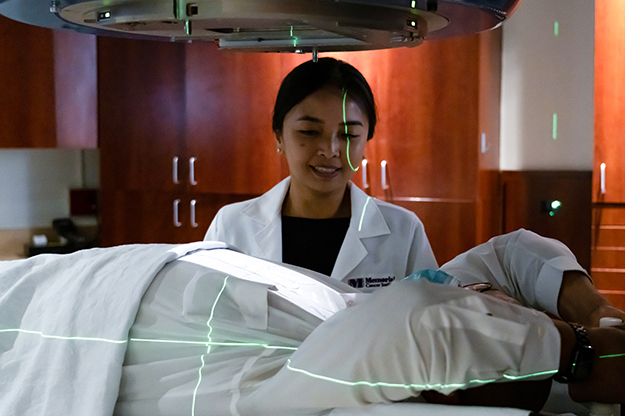
Radiation Oncology
Advanced radiation oncology methods deliver precise treatments to target tumors
Cancer care often requires multiple types of treatment. In addition to surgery and medications like chemotherapy, you may need radiation therapy. Radiation oncology is a highly technical treatment that delivers high-energy X-rays or other types of radioactive energy to kill cancer cells. It also can help relieve pain in late-stage cancer.
What Will My Radiation Oncologist Do?
At Memorial, your radiation oncologist:
- Determines whether radiation is right for you and which types are most appropriate for your needs
- Explains the benefits, risks and side effects of your treatment options so you can make informed decisions
- Plans doses and identifies the precise area of the body to be treated to minimize effects on surrounding tissue
- Collaborates with medical oncologists and surgical oncologists to ensure comprehensive, well-timed care
- Monitors your progress throughout treatment
- Manages the side effects of radiation treatment, such as fatigue and skin changes
- Adjusts the treatment plan based on effectiveness and how you’re tolerating treatment
What Types of Radiation Therapy Does Memorial Offer?
Memorial offers every type of radiation, from traditional approaches to advanced technology.
Radiation can be delivered throughout the entire body (total body irradiation, or TBI) or to a specific location on your body. Your radiation oncologist may also offer hypofractionated radiation therapy. It delivers more doses of radiation per session and can shorten the course of treatment.
Types of radiation therapy we offer include:
External Beam Radiation
This common type of radiation therapy uses a linear accelerator to deliver radiation from outside your body. Memorial offers advanced forms of external beam radiation, including:
- Accelerated partial-breast irradiation (APBI): This one-week breast cancer treatment is an alternative to traditional external beam radiation, which requires several weeks of treatment. It’s most often recommended for people with early-stage breast cancer who had a lumpectomy. Radiation is delivered only to the area from which the tumor was removed rather than the entire breast.
- Image-guided radiation therapy (IGRT): IGRT uses 3D imaging technology to take pictures that show precisely where to aim radiation treatments. IGRT minimizes the effect on healthy tissue exposed to radiation during treatment.
- Intensity-modulated radiation therapy (IMRT): IMRT is a precise type of radiation. We use computers to calculate and customize radiation beams to match the size and shape of the tumor. Focusing radiation directly on the tumor limits the exposure of healthy tissue.
- Stereotactic radiosurgery: This technology applies multiple radiation beams that intersect and converge onto a tumor. It also uses special equipment to position you for precise therapy. One example of our stereotactic radiosurgery technology is CyberKnife, a fully robotic platform.
Brachytherapy
Also called internal beam radiation, brachytherapy involves placing a radioactive substance into a tumor or near it. It’s implanted in the form of a seed, pellet, catheter or capsule. The implant may be temporary or permanent. Your radiation oncology team will teach you how to protect others from radioactivity.
Radiopharmaceuticals
Your radiation oncologist may recommend systemic radiation. This type of radiation delivers radioactive medication by mouth or intravenously, which then travels throughout your body.
Radiation Oncology: Why Choose Memorial Cancer Institute?
When you come to Memorial for radiation therapy, you’ll find:
- Trusted experts: Our board-certified radiation oncologists have advanced (fellowship) training and decades of experience. They are highly skilled in various radiation methods, safety and the latest advances in the field. Meet our team.
- Quality assurance: We have a team of radiation physicists who examine and calibrate equipment regularly. You can be confident that the equipment involved in your care is at peak performance.
- Supportive care: We offer many types of support as you cope with radiation treatment. To help you manage side effects, we may refer you to our nutritionists, oral surgeons, speech therapists and lymphedema clinic. We can also connect you with clinical psychologists, social workers and palliative care specialists.
- Coordinated care: Memorial hosts frequent tumor boards that bring together every type of oncology specialist to discuss your case. These boards combine the expertise of radiation oncologists, medical oncologists, surgical oncologists and others to create your treatment plan.
- Clinical trials: Memorial Cancer Institute conducts clinical trials to improve the delivery and effectiveness of radiation therapy. This means our patients often have access to the latest radiation treatments not available everywhere.












